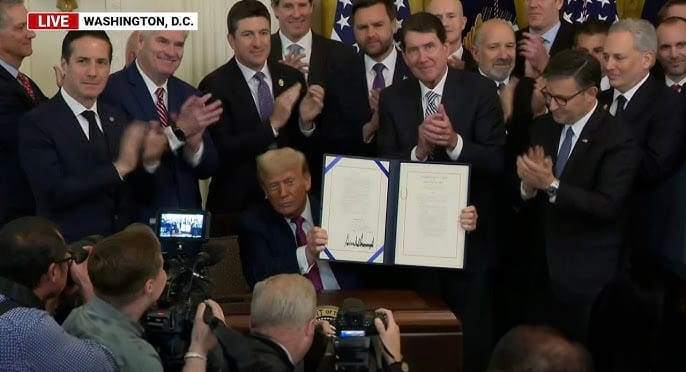Trump Signs GENIUS Act into Law, Paving Way for Stablecoin Regulation

BREAKING: In a historic move for the crypto industry, President Donald Trump just signed the Guiding and Establishing National Innovation for U.S. Stablecoins (GENIUS) Act into law at a White House ceremony on July 18, 2025.
The legislation establishes the first federal regulatory framework for stablecoins, cryptocurrencies pegged to stable assets like the U.S. dollar, marking a significant step toward mainstream adoption and consumer protection. With bipartisan support in Congress, the bill aims to foster innovation while addressing concerns about financial stability and illicit activity. The signing fulfills Trump’s campaign promise to position the United States as a global leader in digital assets.
Video clip of Trump signing the GENIUS Act at the White House
A New Era for Stablecoins
The GENIUS Act introduces clear rules for stablecoin issuers, requiring them to maintain one-to-one reserves with low-risk assets like cash or U.S. Treasury bills. This provision ensures that each stablecoin can be redeemed for its full dollar value, reducing the risk of failures seen in past unregulated ventures. Issuers such as Tether or Circle must also comply with anti-money laundering and sanctions laws, addressing fears that cryptocurrencies could be exploited by fraudsters or adversarial nations. By banning unstable “algorithmic” stablecoins, which have collapsed dramatically in previous years, the law prioritizes consumer safety and market integrity.
The legislation passed the House with a 308-122 vote, following Senate approval in June by a 68-30 margin, reflecting broad bipartisan support. House Financial Services Chairman French Hill emphasized that the bill ensures “American competitiveness and strong guardrails for our consumers.” Industry leaders, including Circle’s chief strategy officer Dante Disparte, hailed the act as a turning point, eliminating “stable-in-name-only” coins and fostering trust in digital currencies. The law assigns oversight to the Federal Reserve for major bank issuers and the Office of the Comptroller of the Currency for nonbank issuers, with state regulators retaining authority over smaller entities.
Stablecoins, with a current market value of $267 billion, are primarily used for trading and as a hedge against volatility in regions with unstable currencies. The GENIUS Act is expected to boost their adoption by banks, fintechs, and retailers, potentially transforming global payment systems. Treasury Secretary Scott Bessent projects the stablecoin market could grow to $2 trillion by the decade’s end, driven by faster, low-cost transactions that bypass traditional banking fees.
Critics, including Senators Elizabeth Warren and Jeff Merkley, argue the bill falls short in addressing conflicts of interest, particularly regarding Trump’s ties to World Liberty Financial, a crypto venture that issued the USD1 stablecoin. While the act prohibits members of Congress from profiting off stablecoins, this restriction does not apply to the president, raising concerns about potential self-enrichment. Despite these objections, the bill’s passage signals a shift from the regulatory uncertainty of the prior administration, which industry advocates claim stifled innovation. As federal regulators now have six months to finalize specific rules, the GENIUS Act sets the stage for a regulated, innovative future for digital currencies in the United States.

